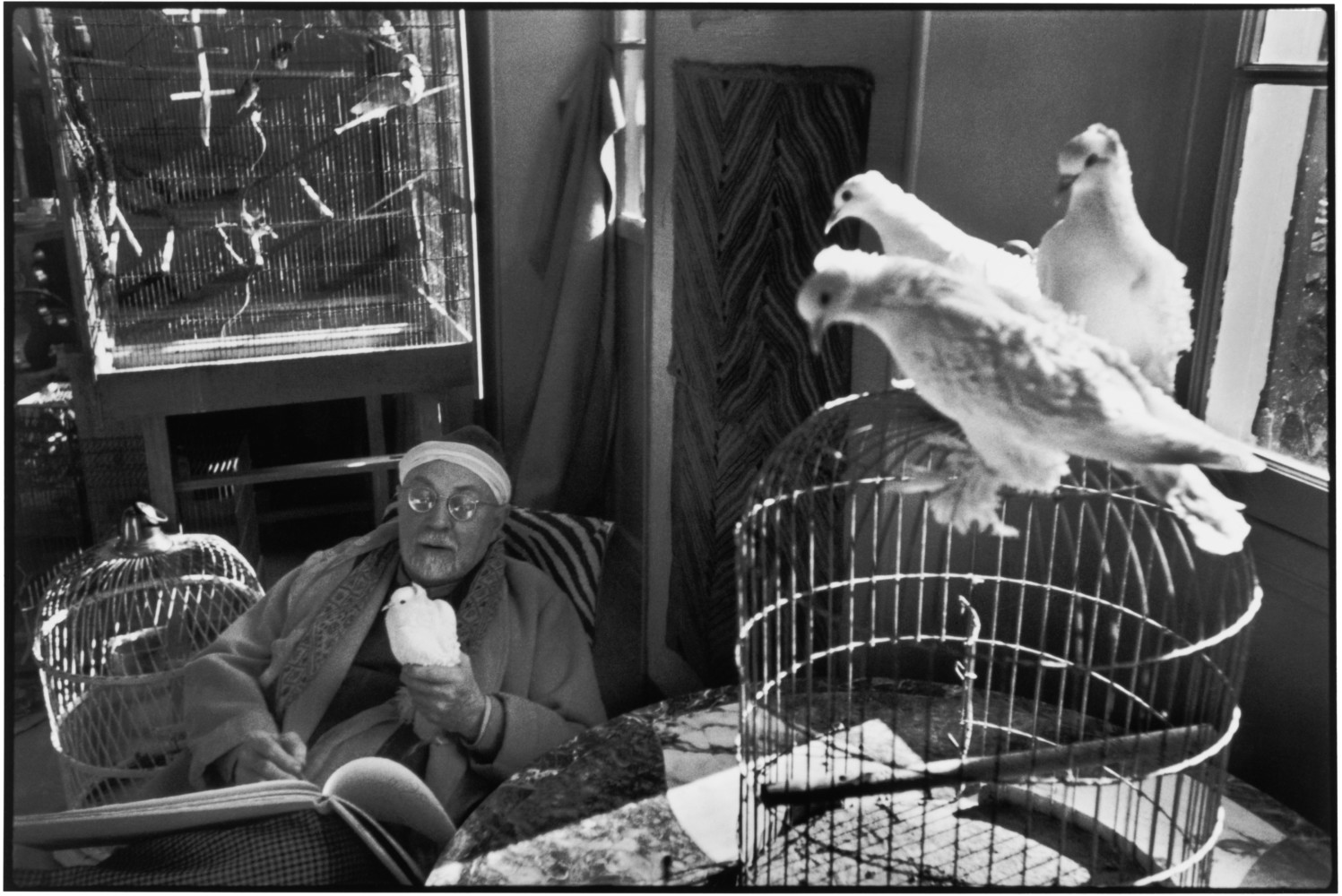My wife was a free spirit, an independent soul. She had an iron will and was used to carving her own path. When I met her, I wanted her, and she came to me, she came to love me… She went down to earth to meet me.
We built a home in the city, in a row of tightly connected houses inside a humble old subdivision. The weather was warm, so heavy, and so humid, but we dealt with it even if we complained daily. We raised our two children there. I also found a new hobby – keeping a group of doves that would daily fly out of five small holes from our balcony. They would launch over the basketball court in the middle of the subdivision, circle wide into the cloudy skies. After some time, they would come back with another loop in the air.
There weren’t many other different types of birds in our city – only the common brown house sparrow, the males with black caps and the females with plain brown faces. They would settle on the cemented pavement like a fine powder, or caper around the green Indian trees with long, thick leaves and rounded edges.
My doves were rather like foreigners in the land. Just like me.
My white skin and light hair would turn heads as I walked through the markets with my wife, and the neighbourhood children’s eyes would open wide in curiosity at me when they’d see me water our plants in front of their houses. Each of my children they regarded as one of them (though with some unspoken, special treatment), but I contentedly remained in the quiet of tending my birds and my garden.
“Daddy, what’s that smell?” my young daughter asked when I brought home the first pair of doves I would care for.
Her question reminded me of that odour which I’d forgotten after the long commute back home from the pet shop – her favorite pet shop at the basement of the mall we frequented – that odour, which had been mingled with the fumes of the cars, buses, and jeepneys in the Manila traffic I endured to get back home.
I breathed in and smelled the distinct animal scent, the stuffiness of bird feathers, and the idea of contamination.
I had argued with my wife about keeping these birds. I told her I would keep them in the balcony where fresh air would keep the birds’ odour away. She thought about the expenses of keeping them, and why couldn’t we just get smaller, less smellier pets for our little kids.
“This is just for you,” she said. “Not for them.”
“Mahal – my love,” I replied, “I can teach them how to care for these doves. Besides, they aren’t asking us for pets yet.”
Presently, my second daughter came into the room and jumped with glee at seeing the cage I held. She screamed in glee, and running to take a closer look, she said, “Wow! They’re so pretty!”
I smiled as they followed me upstairs, where I put them in the balcony. Later on, I built a wooden nesting home for them and the three other pairs I bought. The first and second pair were pure white doves, while the third pair were of the greyish brown, ring-necked breed.
As my wife and I had coffee on the balcony during a cool January day, when the breeze was blowing, I pointed at our first pair of doves and said, “Remember the ones we released at our wedding?”
She smiled and closed her eyes. The memory of her in her white wedding dress, standing so serenely and speaking so gently, with her arm in mine before the pastor as we made our vows, also came back to me as I watched her now with the coffee cup in her hand. She had given up a life of independence to be yoked with me; she had given up her lofty position in the company she began to be able to raise our children as they grew older.
She was that fiery, tomboyish woman at work whom I first feared. We had worked together for several projects and found that we disagreed on almost every point. She always wanted her way, wanted to take a lot of risks, wanting to be the best – but I always kept myself grounded, remembering what was exactly required of us… We fought a lot, but I began to like her. Eventually I found myself meeting her father to ask for permission to court her. He must’ve had some reservations about this white boy standing in front of him asking for his daughter’s hand, but he said he’d known me for a while and trusted me with her.
He walked her proudly up to me as I stood by the altar, with my face soaked in tears, and released her to me. I would now be her keeper, and she would be mine.
***
Years and years later I watched our doves gliding in vast loops in the far-away sky. These were the descendants of the first families we had kept together in our small Manila home. I looked down at the wide, hardbound book I was reading. It was a children’s book on indigenous birds that my eldest daughter had researched about and illustrated.
My youngest daughter entered through the balcony door and wordlessly cleaned out the bird boxes opposite to me. After several minutes and after she’d washed her hands in the small bathroom behind the wall to my back, she took out one of the doves and gave them to me. I felt the scratch of its talons and the softness of its white feathers as I enclosed it in my hand. I stroked its nape as I continued reading the book.
Later, my daughter came back with two cups of 3-in-1 coffee.
“Just like you and Mama used to have,” she said with a grin, as she put the cups down and returned my dove to its little house.
I also smiled, but my eyes fell in a sudden swell of sadness. They rested on the drawing of a ferocious eagle – the Filipino national bird, the haribon – with a focused gaze a strong, black face and beak, and its most prominent feature: a fan-like, large white crest outlined with brown that encircled its head.
At first, I didn’t regard it carefully, as my lips were silently forming my wife’s name. She had left us alone, marooned in our mortality, meeting our Creator before any of us did. She beat us to it – which was just like her; she loved beating everyone else to first place all the time.
I wish you didn’t do it this time, mahal, my love.
I looked at my daughter, who was watching the sky, and I saw her mother’s features lining her face. She was a gentler spirit like me, and we enjoyed the comfort of each other’s presence in silence. She moved back in to keep me company the year before, after her mother died. We didn’t say much to each other, but the time we spent together was enough.
I looked down again at the book, and at the wildness of the eagle. It led me to recall my wife’s facial expressions whenever we fought each other – or fought for each other. She never failed to show that resolve during the struggles of our life together – she was my strong helper, my most passionate advocate, and my bold muse.
I remembered our wedding vows – we also fought over them because she thought the final part was overly clichéd, but they were as followed: “I will have you, from this day forward, for better, for worse, for richer, for poorer, in sickness and in health, to love and to cherish, till death do us part, according to God’s holy ordinance; and thereto – I pledge you myself.”
We released the doves together outside the church and laughed as we looked into each other’s eyes. We knew we could make it happen – we knew we would keep each other to the death.
And I pondered on this as my daughter left me and went back into the house. I was still tied to my dear, dear wife; I still kept the memory of her. Death had not parted us. And one by one, the doves came back from the sky and returned to me. ♦
Author’s Note: This is a story I wrote in 2020 as part of an essay-quiz for Armenian Language & Literature (yes, it’s crazy, but it was also the pandemic so we had some odd quiz tasks). We were given some photographs as prompts and I chose these ones:
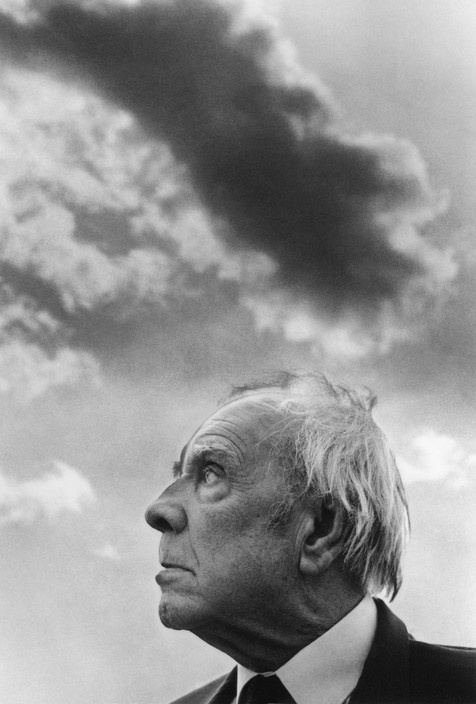
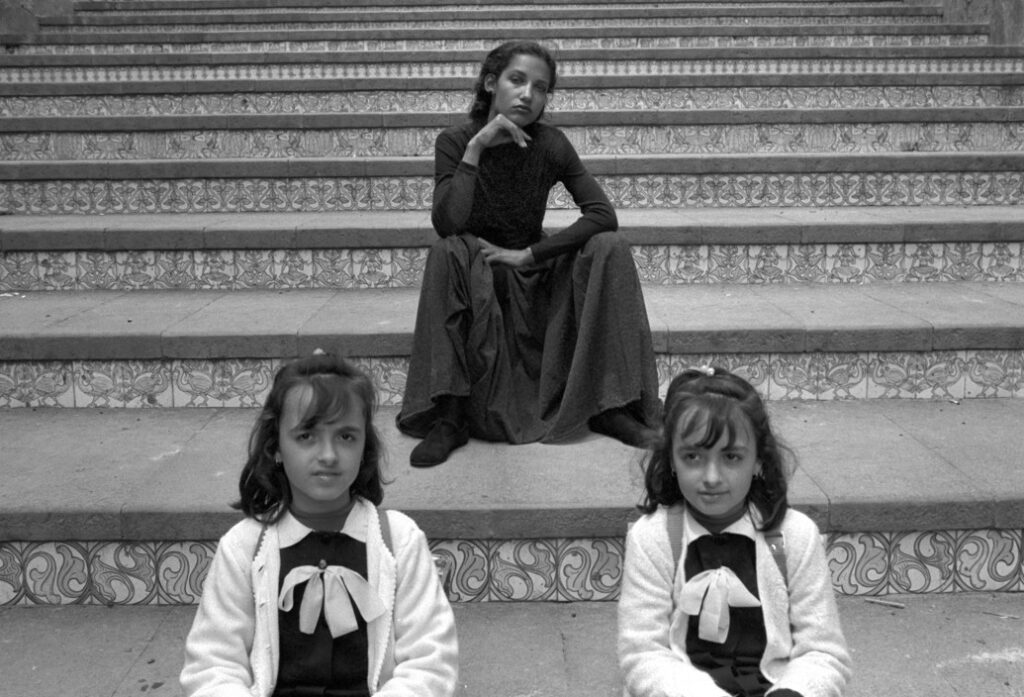
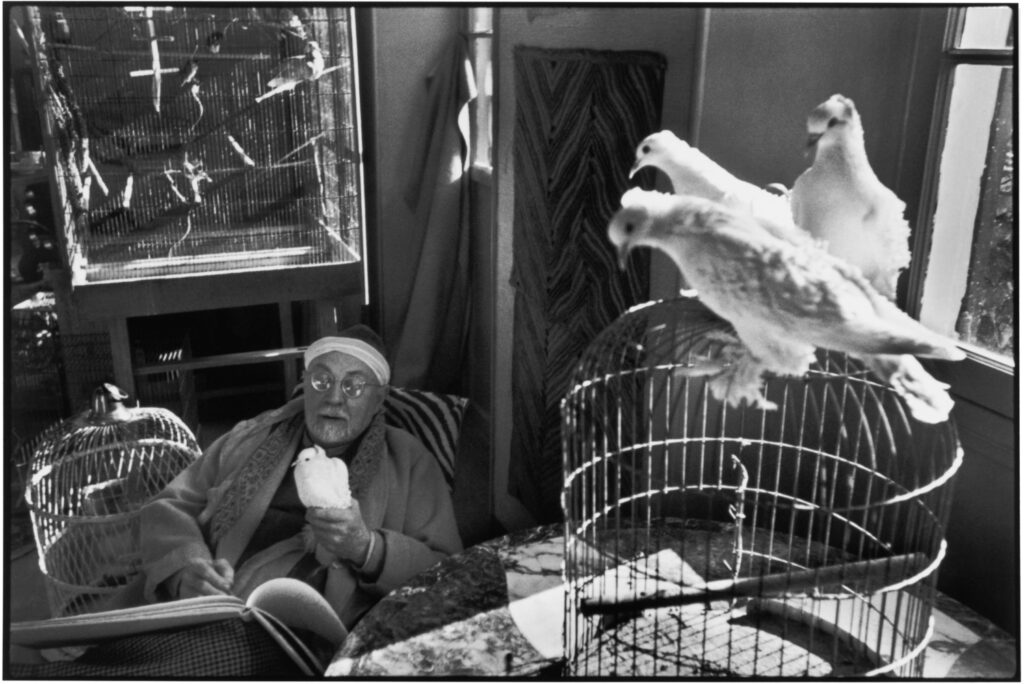
I had previously shared this story years ago on this blog, but the post got lost – along with the minor edits I made for it. So this is some different iteration of the story now. Like some other sibling of that old one that previously existed in my blog.
I have been wanting to share this story again – especially during the death anniversary of a family friend last April 1. He inspired my main character’s father-in-law, but I forgot to share it here… Better late than never. (I hope this somehow honours you, Tito Ferdie. We miss you!)
I finally laid it out here today after finding a Jorge Luis Borges short story (“Funes the Memorious”) being quoted in “The Nolan Variations” by Tom Shone, which is a biography of Christopher Nolan. I’d read that Borges story for a university class; I love Borges’ work although it’s hard to read through. But I also remembered my own short story since it was inspired by a Borges photograph, as shown above. (I actually didn’t know it was Borges when I wrote the story; I only found out when I put the picture in my blog years ago, and the metadata showed that it was a portrait of Borges.) Here’s a screenshot from the Nolan book:
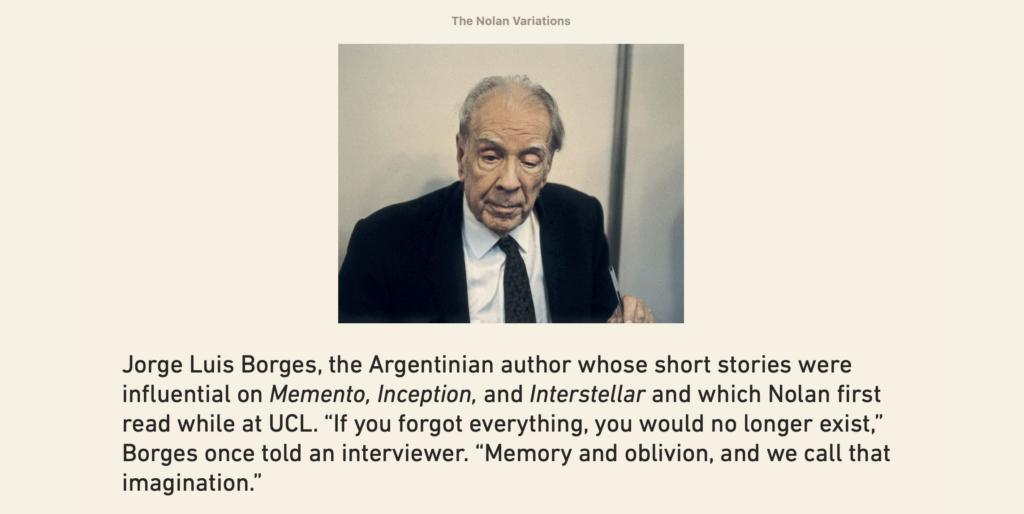
I’ve also been meditating on the idea of a “keeper” these days. So I’m glad I could revisit this story again and polish it a bit.
I hope you enjoyed reading. Let me know what you thought of it. 🙂
